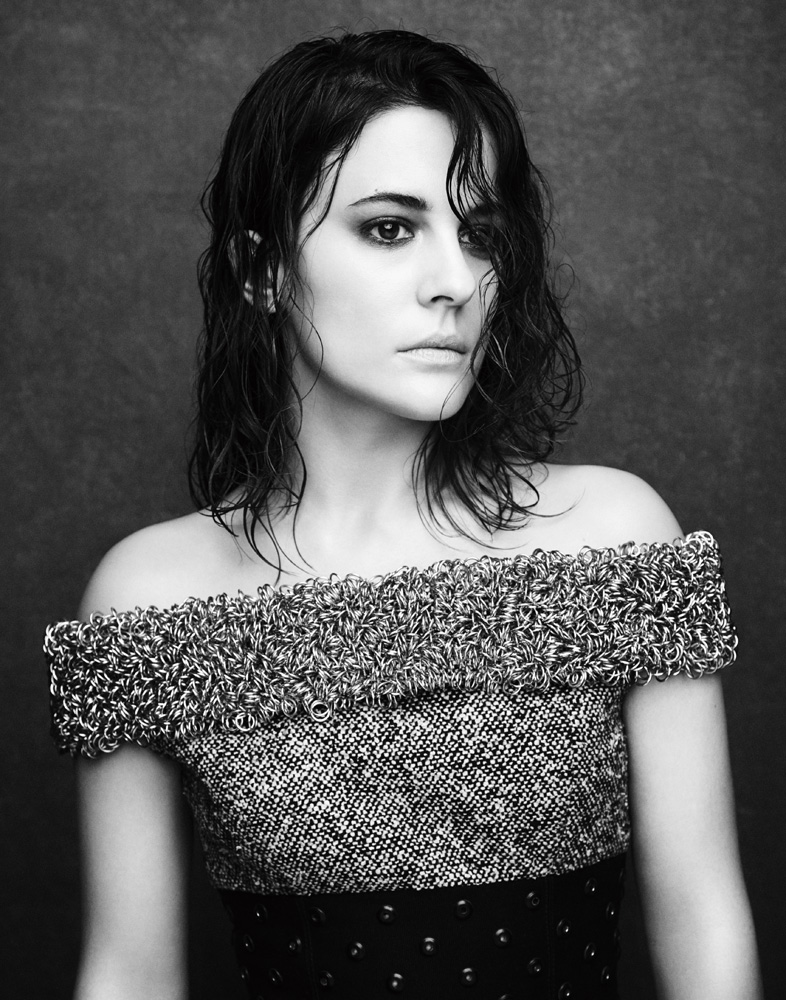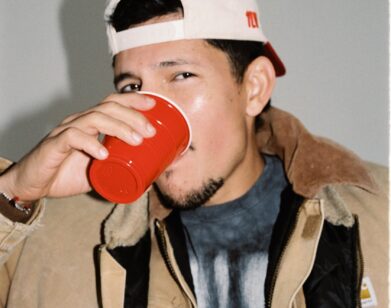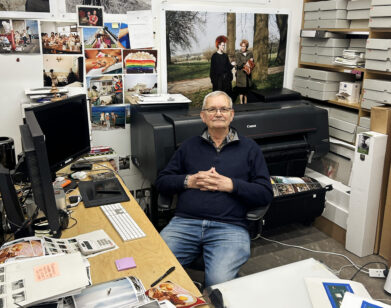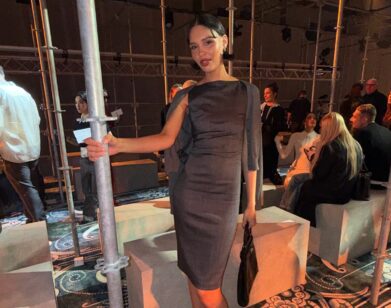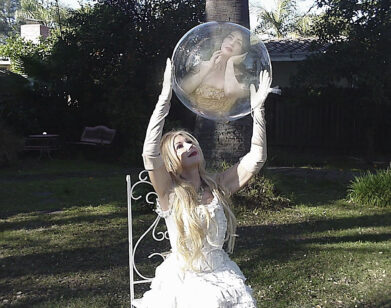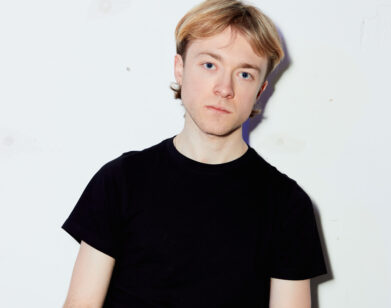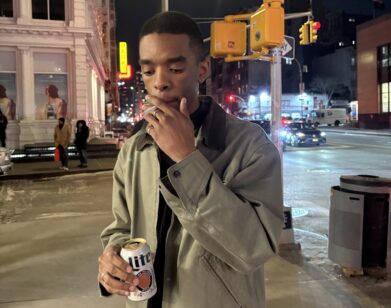Discovery: Phoebe Fox
PHOEBE FOX IN LONDON, SEPTEMBER 2015. PHOTOS: MATT HOLYOAK/KAYTE ELLIS AGENCY. STYLING: NATALIE BREWSTER. MAKEUP: AKGUN/THE LONDON STYLE AGENCY. HAIR: LARRY KING/STREETERS LONDON. POST PRODUCTION BY SHOEMAKERS ELVES LONDON.
In spite of its Greek tragedy-inspired structure, Arthur Miller’s A View from the Bridge is a quintessentially American play. Set in Red Hook in the 1950s, it’s an urban immigrant tale (an Italian-American family helping their impoverished Italian-Italian relatives settle illegally in New York City) filled with the bitter hardship of traditional masculinity and working class emotional repression. It is an omnipresent part of Post-war American identity, a high-school curriculum stalwart, and Broadway favorite, with recent productions featuring Scarlett Johansson and Liev Schreiber (2010), and Allison Janney, Anthony LaPaglia, and Brittany Murphy (1997).
It might seem strange, then, that the Lyceum’s production of A View From the Bridge, which officially opened last night, is the most buzzed-about new play on Broadway. Stranger still that the cast is almost entirely composed of British actors (including Mark Strong, The History Boys’ Russell Tovey, Babylon‘s Nicola Walker, and newcomer Phoebe Fox) with a Belgian director, Ivo van Hove. But van Hove and his actors strip Miller’s play down to its raw essentials: there are no real sets, props, or elaborate scene changes or costumes, but there are plenty of beats, blood, and pain.
For Royal Academy of Dramatic Art graduate Fox, A View from a Bridge is one in a series of exciting upcoming projects. The 28-year-old Londoner made her American film debut earlier this autumn in Eye in the Sky at the Toronto Film Festival, in which she plays a drone operator alongside Aaron Paul and Alan Rickman. Next year, her miniseries Close to the Enemy about Nazis hidden in Britain at the beginning of the Cold War will premiere on Starz.
EMMA BROWN: When did you decide to go to drama school?
PHOEBE FOX: I’d always wanted to go to drama school. My life plan was to get into drama school and become an actor, but it took me three years. I applied while I was still at school in my final year, and I didn’t get in anywhere, so I took a job in a comedy club—not doing stand-up comedy, because that’s my idea of hell, but in the office—and I went traveling. I applied a second time and didn’t get in anywhere again. But because that’s all I ever wanted to do, I had to keep persevering, and thankfully, the third time, lucky.
BROWN: Even since the age of five?
FOX: Yeah. My parents are actors as well, so I grew up around that world. It was always a very romantic, mythical world. They did a lot of theater, so to me an actor was getting to come backstage and dressing room mirrors with bulbs around them and trying on people’s costumes. It was very exciting to me as a child. But then at the same time I always had—and do have, I think—a very level-headed and grounded attitude towards the reality of the industry, which is that’s it’s tough. All things my parents went through.
BROWN: Were your parents quite supportive? Or did they encourage you to pursue a more steady career?
FOX: I only remember one conversation where they sat me down and said, “Are you really sure you want to do this? It’s not an easy life.” But I think that they knew that I was not to be discouraged; they knew I was set on it. I guess they assumed that, because I was so set on what I wanted to do, it would help me get through all the hard times. And they were right. I persevered through three years of rejection from every major drama school in England.
BROWN: Obviously RADA is an amazing school, but did you choose to go there over other options or was it the school that accepted you?
FOX: No, it was the school that let me in and thankfully it was a good one! I was completely overwhelmed by getting into that school and not any of the others. I can still access that pure joy that I felt about getting into drama school, and it does sometimes get me through when you’re feeling a bit cynical about the industry and you get great jobs and you start to get a bit blasé about it. Whenever I’m getting a bit like that, I think, “No, no. Remember what you felt just to get into drama school. Try and get back there.”
BROWN: What was your first job when you graduated?
FOX: It was a play in Chichester, which is a regional theater, but a very good one. I did a Brian Friel adaptation of a play called A Month in the Country. It was a perfect first job, because it was only two or three young people and about 10 older actors, and that in itself can be an education. They were a very inspiring group. It was lovely. I did a succession of plays and it was only a couple of years in that I started to do any TV.
BROWN: Actors always tell me that the big English drama schools don’t really prepare you for film and TV work because the curriculum is still quite theater-focused. Is that how you felt?
FOX: Yeah, totally. The camera course was a bit crap. But when I was in drama school, I wasn’t interested. I wanted to be a stage actress. I was not interested in learning camera craft. But then you throw yourself in the deep end when you do get a job in front of the camera because you have absolutely no idea what you’re doing, and it is a skill. I’m still learning how to maneuver around the technicality of working on camera while trying to remain true to the moment. I tend to want to go quite big in my acting, which you just cannot do in front of a camera. It’s taken me a while to learn how to pull it back.
BROWN: What was your first on-camera job? I saw on IMDb that you were “Girl in Bar” in One Day.
FOX: Yes, I was. I think that was my first one. I did half a day on that. I had three lines, which then got cut, so I literally was just “Girl in Bar,” whom Jim Sturgess tried to chat up. I just worked with him when I was playing one of the leading roles and he was the lead, and I had that embarrassing moment of, about three weeks in, saying, “You know, we’ve actually worked together before. You probably don’t remember, but I played ‘Girl in Bar.'” Bless him, he was very gracious, but I don’t think he actually remembered.
BROWN: I also heard that you used to make movies or put on plays with your sister. Is that true?
FOX: Yeah, we were really into it as kids. We mainly did films, actually. Murder mysteries. I don’t know why that genre. Looking back, I did seem to be the victim a lot—I did quite a lot of dying, which exorcised my need to be overly dramatic and play the tragic character. I got to do lots of tragic deaths. We used to film them over a couple of days. Mum and Dad would get roped in to either be characters or work the camera. It’s quite funny; we had no idea of continuity, so there’s scenes that took us 24 hours to film, and they go from light to dark to light again and the scene’s only meant to be an hour long. [laughs] But we loved it. We still watch them back sometimes to basically humiliate each other because the acting is just so bad.
BROWN: Is your sister older or younger?
FOX: She’s older than me, so she was the director/producer and sometimes wrote the scripts.
BROWN: So that’s why you always died. How did you get involved in A View From the Bridge?
FOX: I saw the Young Vic announce it as part of their season, and I don’t generally do this, but I emailed my agents and said, “I want to go up for that.” The kind of roles that I’m right for on stage tend to be quite young, and ingénue roles can be a little unfulfilling. They tend to fall into one slot: play the innocent young girl who comes on and does a lot of crying–which I do in View From the Bridge to a certain extent, but she’s a much more interesting character than you usually get for that casting bracket. I loved the Young Vic Theatre, which is where it started. And I was interested in this director, who I didn’t know at all, but there are clips of the work he’s done on YouTube and it’s so out-there and crazy and inspiring. Doing shows that last five hours and the audience could get up on stage and make coffee and sit on the sofa with the actors while they acted around them. I was excited about doing a classic play in this non-conventional way, especially since before that I’d done a very, very traditional take of King Lear. I think the type of theater I like to watch is a little bolder than that.
I auditioned, but our director doesn’t really audition people because he has his own theater company. He doesn’t really know how to do it. He didn’t say anything, bar “hello.” No notes. No chat. I had two auditions, and when I got the job, I realized I had absolutely no idea what his concept was. I had no idea what I was walking into at all. I remember the first day he had a slideshow of pictures, and he came to this picture of a girl riding a boy in her bra with this sort of grimace and she was eyeballing the camera. He was like, “This is Catherine and Rodolpho.” I was like, “What?” It wouldn’t have been my first idea of what Catherine and Rodolpho were like. I turned to the guy playing Rodolpho in London and I said, “You know that sex scene that happens off stage? I reckon that’s probably going to happen on stage.” And I was right. But I sort of love that.
BROWN: So it Russell Tovey didn’t play the part of Rodolpho in London?
FOX: No, a guy called Luke Norris did it at the Young Vic and when we transferred to the West End. He was already contracted to do another job, so he couldn’t come to Broadway.
BROWN: Does the play have a lot of stage directions?
FOX: It does have some, but we have ignored a lot of them. Some we’ve kept in, weirdly, considering that we have no props. In the first scene there should be coffee, and I leave the stage to go get the coffee and just come back on. There are quite a lot of moments like that, where Beatrice leaves the stage to go make dinner and bring the dinner on, and she just comes back on. We’ve made these moves off stage for other reasons, mentally, whether or not the audience gets that. So we’ve have kept some of them in, but we’ve basically stuck with the lines and everything else has been scrapped.
BROWN: Had you seen the play before?
FOX: I hadn’t, no. I had no idea, really, what the interpretation should be, except that in the play it very clearly maps out what the house should look like: it’s a tenement flat, there should be stairs on one side, there should be a phone box, there should be this, there should be that.
BROWN: What about in terms of Catherine’s relationships with Rodolpho and Eddie? It seems like there is a lot of flexibility in how you could play them.
FOX: Yeah. We’ve definitely pushed it one way in this. Our director was very keen to make the relationship between Eddie and Catherine quite sensual and provocative. They don’t see that there’s anything wrong with it, but he wanted the audience to feel uncomfortable with it in that first scene. A lot of people I know who saw it, who didn’t know the play [beforehand], were confused, which I think is great. In the first scene, you think, “Oh, it’s his…”
BROWN: Girlfriend.
FOX: Yes. And then Beatrice comes on and there’s a moment of, “Oh no. She’s like his daughter.” And he really pushed us to make those choices. He didn’t tell us how to do it, he just said, “You have to be touching people all the time.” It was me and Mark that came up with how we translated that on stage.
BROWN: There’s one particularly disturbing moment where Eddie is absent-mindedly stroking Catherine’s leg.
FOX: All I can think in that moment is how prickly my leg feels. I keep meaning to sit Mark down, “I do shave my legs every day, Mark, I promise, but I’m so cold.” There is a real moment where I’m totally Phoebe Fox on stage worrying about my shaved or non-shaved legs rather than Catherine worrying about her uncle touching up her leg. In a way, that’s sort of right, because she shouldn’t be aware that there’s something wrong with that. To them, that’s just a hug.
BROWN: What about the Rodolpho relationship? Did Ivo say anything about that or did he let it grow organically?
FOX: He did let it grow organically. I think it’s a fairly classical take on that relationship. Sometimes people play it that Rodolpho is very effeminate, and you wonder more whether he is gay and is using her. But I have heard Ivo say—and Luke is the same build as Russell—that he deliberately cast someone who walks on stage and he’s not effeminate, and it’s really all in Eddie’s mind.
BROWN: Did the dynamic between Catherine and Rodolpho change when Russell replaced Luke?
FOX: Definitely. You sort of have to let it because they are different people. Russell is much lighter and a natural comic. That first scene where he arrives, it’s much more effervescent. Although Luke went for it, Luke is a lot darker as a person and that sort of came across. That was the main thing. They’re similar in build and look, and some aspects you just have to honor the script and what the relationship’s meant to be like.
BROWN: I assume the audience reaction is pretty consistent. Have you had any performances where the atmosphere just felt completely off?
FOX: No, weirdly. It’s changed over time. We always get a good reaction—people seem to like it. Obviously we do get people who really don’t connect with it at all. But where we started it, because of the shape of the theater, everyone was a lot closer and people had huge, emotional reactions. I had friends who had to leave the theater and walk around the block before they could come and speak to me in the bar. Friends locking themselves in the toilet crying their eyes out. It was really firey and hugely emotional at the Young Vic. And I think it’s just the nature of the spaces that we moved into. But generally people seem to really connect to it.
We had the sound cut out the other day, and you realize actually how manipulative the music is, not just for the audience, but for the actors as well. It really makes you feel something, and then when it’s gone, you’re like, “Oh, wow. We’re really being helped by that.” I don’t think I’ve done any other play that’s had a constant soundtrack underneath it. A lot of it is not very obvious, but once it’s gone, you realize as an actor you are relying on it to make you feel tense or upset.
BROWN: The beats in between pauses are so well done.
FOX: The beats are great. We did a show in London where the sound cut out through the whole show. The audience knew that—there was an announcement at the beginning of the show—but without a beat, the scene with the long pauses felt so tense for us. At least when we’re not speaking, the audience can hear this banging knock. Without that, those breaks felt excruciatingly long. I think Tom Gibbons, who is the sound designer, is amazing.
BROWN: How do you avoid going into autopilot when you’ve been doing a play for so long?
FOX: It sounds like I’m really bigging myself up, but I really haven’t with this. I don’t think you can. The play is so good, it constantly opens up. You really do discover stuff quite regularly. I’ve been surprised, because I’ve done other plays where you’re a little bit hungover or it’s the second show of the day and you just switch off and let it happen. But with this you don’t want to because it just hooks you in. There are no breaks—it’s just two hours—so for some of us that don’t leave the stage that much, you just whip through it. Suddenly you’re caught up in it and then it’s the end. The only moment is when I lie down on the side for a whole scene with the lawyer and Eddie. I do a little switch-off there and think, “I wish I could be backstage and have a cup of tea.” I try not to think of the audience, because I can see them so clearly.
BROWN: You’ve got quite a few exciting projects coming up between the play, your film Eye in the Sky, which was at the Toronto International Film Festival, and your upcoming miniseries Close to the Enemy. Does this feel like a moment for you?
FOX: I try not to think about it, I guess, because a lot of people have said to me, “Oh my god, you’re going to Broadway with this hit show. You’ve got stuff coming out. Things are going to happen. This is the moment.” You start to believe it and then suddenly you’ve put this terrible pressure on yourself and instead of enjoying it, you think, “But what if nothing happens?” And then you’re walking around in this abject fear that you’re not going to live up to this promise that everyone has made you. I’m definitely doing much bigger projects now than I have done in the last couple of years. I can definitely feel my casting is changing—the sort of things I can even get seen for is changing.
BROWN: Has anyone approached you about a role since seeing A View From the Bridge?
FOX: Yeah, when we were doing it at the Young Vic, the few jobs I got after that were a direct consequence of doing that play. The first thing I did after was my first lead role on TV. It was a three-part BBC miniseries, and I don’t think I would’ve gotten that if I hadn’t been in View From a Bridge.
BROWN: I wanted to talk about Close to the Enemy as well. You mentioned you didn’t know a lot about the subject matter before you signed on.
FOX: I imagine the British government kind of wants to sweep it under the carpet. No one wants to admit that, in some ways, they failed the victims of the Nazi regime in the fact that not enough of them were called upon to stand trial for their crimes. And then you find out, doing research for this, that not only did they not go after them, they were actually helping a lot of them and bartering with them for information. I wonder, personally, whether they would say now that it was worth it. The things that we found out from the Nazis that you allowed to live a full life until they were in their 90s, did that stop us from going into nuclear war with the Russians? Would you really say that? I don’t know.
BROWN: Have you ever read about the Cambridge Five?
FOX: I don’t know a lot about them, but I know who you mean.
BROWN: When you read about them, it seems so obvious that they were spying for the USSR. There were so many flagrant signs, and it feels like if M16 weren’t such an old boys club at the time, they would have realized.
FOX: It’s the same thing. The group that my character’s meant to be part of—the department she’s meant to have worked for before the start of the drama, looking into them, there were so many signs that their secret agents had been infiltrated by the Nazis. So, so many. But they say now that clearly the guy who ran it didn’t want to believe it. All of these agents had special passwords to give when they were in distress, and they were giving them across the radio signals, and the head of department was just ignoring it. They kept sending more spies, and the Nazis knew exactly where they were going to land and who they were. They just stood there waiting for them. These poor kids, really, a lot of young women, were being dropped out of the sky and landing straight into Nazi hands. You think, that’s so awful. What was it? Was it his pride? People always think of the First World War as a major fuckup in terms of how it was run, and the major leading figures behind it—the boys on the ground were at the mercy of these people who had no idea what they were doing. But it sounds like Second World War was just the same. It’s scary and depressing.
BROWN: What agency does your character work for?
FOX: At the start of the drama, when that department broke up, her boss—who was a real woman called Vera Atkins and who my character was also sort of based on—took it upon herself to find these war criminals. She tried to find her agents that had gone missing in action. My character is sort of part of that. They are in this tiny department within the government that has no money and no one respects them called the War Crimes Investigation Unit. My character is a very passionate and forthright woman, but she has to be. Reading about it, you sense why this character is so frustrated. It’s very inspiring, but sad.
A VIEW FROM THE BRIDGE IS NOW OPEN AT THE LYCEUM THEATRE IN NEW YORK CITY. EYE IN THE SKY AND CLOSE TO THE ENEMY ARE DUE OUT IN 2016.

